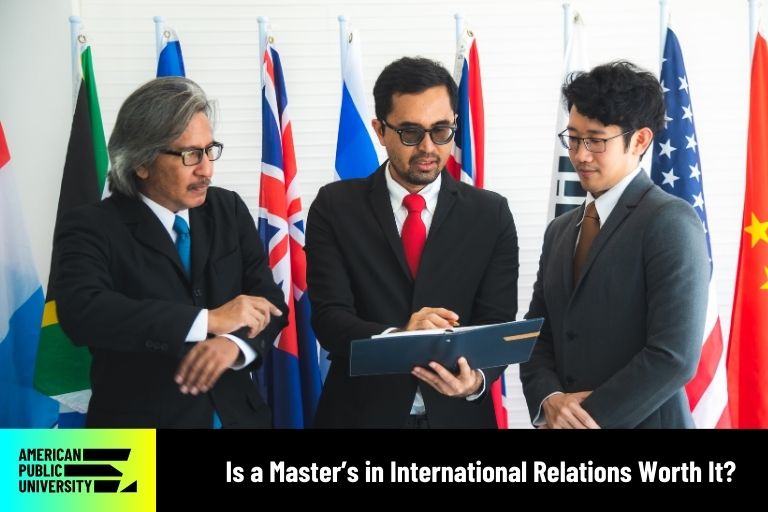05/13/2025

Exploring If a Graduate Degree in International Relations Is the Right Path
For many students drawn to global issues, foreign policy, and diplomatic strategy, an International Relations graduate degree provides both meaningful academic enrichment and the opportunity to explore the complexities of today’s international landscape. International relations programs are designed to help students build a strong foundation in political science, global affairs, and cross-cultural communication—skills that may support a wide range of globally focused roles.
Through coursework in areas such as international law, global economics, human rights, and diplomacy, students may gain valuable insights into the structures that shape global cooperation and conflict. While a master’s in international relations is not required for every international role, it may be a worthwhile investment for prospective students who want to deepen their understanding of international systems and pursue work related to global development or public policy.
What You’ll Learn by Studying International Relations
Studying international relations at the graduate level involves exploring political science, international law, global economics, and diplomacy. A master’s degree in international relations provides a broad, interdisciplinary approach that helps students understand how states interact, how global organizations operate, and how foreign policy decisions shape global events.
Students in international relations programs develop research skills, critical thinking, and public policy knowledge through coursework and hands-on learning experiences. These programs also encourage global awareness and the ability to analyze complex international challenges.
Benefits of a Master’s in International Relations
One of the primary benefits of a master’s in international relations is the ability to engage deeply with global affairs. Courses often include topics such as:
- International relations theory
- International law and diplomacy
- Global economics and political economy
- Foreign policy analysis
- Conflict resolution and negotiation
- International organizations and governance
- Comparative politics
- Human rights and global security
Students may also have the opportunity to develop foreign language skills and cultural awareness, which are often valued in global roles.
Master’s programs also support networking through seminars, mentorships, and research collaboration. These connections may help students better understand how to navigate the international job market after graduation.
Career Opportunities with a Master’s in International Relations
Prospective students with an international relations degree could pursue career opportunities in government, nonprofit work, international business, and beyond. While job opportunities vary greatly depending on specialization, experience, and region, a master’s degree in this field may open doors in the following areas:
- Public policy and political analysis
- Foreign service and diplomacy
- Global development and international organizations
- Humanitarian relief or advocacy work
- International economics and trade policy
- National security or intelligence analysis
- NGO management or global education programs
Some graduates work with global organizations such as the United Nations, the World Bank, or Amnesty International. Others pursue roles in government affairs, foreign service, or cultural exchange.
It’s important to remember that success in the international relations job market depends on more than the degree alone—language proficiency, practical experience, and strong relationships within the field also play a role.
Key Skills Developed Through International Relations Courses
International relations programs help students build a wide set of competencies that are useful in global careers. These include:
- Critical thinking: Analyzing international systems and global trends
- Research methods: Gathering, interpreting, and presenting data
- Communication: Writing policy briefs, delivering presentations, and negotiating
- Cultural awareness: Working with people from diverse backgrounds
- Strategic thinking: Understanding international security and foreign policy
Developing these important skills may help students contribute meaningfully in a wide range of professional environments.
What to Expect in a Master’s in International Relations Program
Most master’s in international relations programs take approximately two years of full-time study to complete. The curriculum typically includes:
- Core courses in international relations theory, law, and global governance
- Elective courses on topics like human rights, global security, and environmental policy
- A capstone project, thesis, or applied research component
- Opportunities for language training or study abroad
- Seminars focused on foreign policy, public policy, or global trade
Some international relations programs are available online, offering additional flexibility for working professionals.
How a Master’s in International Relations Can Shape Your Global Career
For prospective students eager to make an impact in the international arena, a master's degree in international relations may offer foundational knowledge in understanding global systems and contributing to public dialogue on foreign policy and diplomacy.
While a degree does not guarantee job placement, studying international relations may support long-term academic and professional growth. It may also offer a gateway into the global conversations that shape our world—connecting students with international peers and the ideas needed to help address complex challenges like humanitarian crises and global conflict.